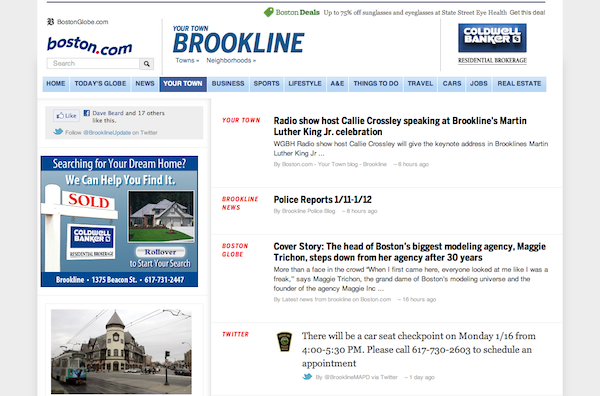
The Boston Globe is quietly testing a redesign of its Your Town product on Boston.com to give the locally focused sites a more engaged, real-time feel. And “real-time feel” is short for a blog-like, Twitter-like stream of stories and information.
Your Town is a network of 50 sites dedicated to local news in the towns surrounding Boston proper, places like Cambridge (home of the Lab), Quincy, Salem, and Brookline. It’s the Brookline site where the Globe is testing out a new two column look — change from the three-column layout before — with a main well dedicated to aggregating local news and a left rail that’s home to ads, local services, an events calendar and links for SeeClickFix.
It’s a clean, open kind of design, which, on first glance is very bloggy and a little Twitter-esque. Jim Bodor, director of product development for Boston.com, said that’s exactly the idea. Over email Bodor told me they wanted to create a “dashboard for a reader’s community.”
“The design changes are aimed at giving the Your Town home pages a more social and real-time feel,” he said.
The Your Town sites, which are staffed by an editor and a writer, are by and large aggregators, combining regional town coverage from the Globe, but also incorporating local blogs and other community news sites (like the blog of the local police department). But the new look also aggregates individual tweets hand-plucked from locals on Twitter, displaying them inline with other news in the feed. A tweet earns the same visual rank as a Globe story, each its own solo news item.
It’s common for news sites to include Twitter widgets displaying their own tweets or those from trusted sources, but it’s rare to see tweets themselves — particularly non-staff-produced tweets — displayed as a unit of news. Bodor said what’s happening on Twitter is part of the broader news discussion in a community, one that a segment of readers already knows about. This amplifies that to a larger audience and creates a richer site, he said.
“Before we launched the new site, we identified prominent tweeters in Brookline who we know tweet regularly about local topics, and are automatically incorporating those tweets into the stream,” he said.
Employing Twitter makes for a good two-for-one opportunity. By sourcing and prominently featuring tweets from the community Your Town not only can add to the amount of content on sites but also extend a hand to readers and create a more engaged audience. That’s important because the Your Town sites are in a competitive local-news space that includes Patch sites as well as the Wicked Local network competing on school coverage, traffic and road updates, and sports from Pop Warner on up.
And now with the recent split between Boston.com and BostonGlobe.com, readers, especially those in the ring around the bay, have a stark choice to make between free and paid, not just regional and local news. A redesign, and the inclusion of Twitter, while not exactly earth shattering moves, could help move readers in the direction of Boston.com and Your Town sites.
It’s been three years since the Your Town sites launched and, aside from the usual town-by-town fluctuations, they maintain steady traffic. While not going into specifics, Bodor said Your Town “is driving significant, material traffic throughout Boston.com,” and is consistently among the 10 best performing parts of Boston.com.
Since the Brookline site went live a few weeks ago, Bodor and his team have been monitoring readers responses as well as any bugs or issues that pop up. They’re calling the Brookline site a beta, but plan to rollout the same design scheme across the rest of the sites in the next few months.